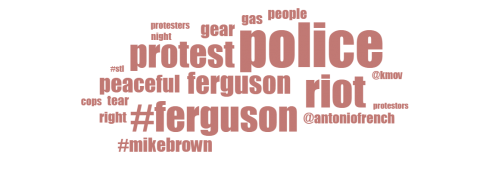Question: When discussing the demonstrations in the month following the death of Michael Brown (August 7th-September 7th), did the twitter community refer to and view the demonstrations as riots or protests? When the protests were discussed what popular topics were touched on?
Analysis of Word Cloud: In narrowing my keyword search to "riot OR protest," I was presented with a word cloud image that showed heavy existence and importance of the words "protest," "police," and "ferguson." I wanted to look further into the use of the word protest versus riot when referring to the Ferguson demonstrations because one of our class sessions focused heavily on ideologies of white protests versus black riots. Most tweets including the word protest were informing users of the whereabouts of the protestors or updating the public in regards to the presence of police in riot gear. The word riot was used more as a way to describe the appearance of the police, rather than descrbing the rally in negative terms as a riot. Overall, the twitter community that was tweeting about the Ferguson rallies was referring to it as a peaceful protest rather than a riot; if anything, many users' tweets were concerned with the presence of the police in riot gear and tear gas masks. Still, in observing the listed tweets with these specific keywords, is it possible that the database leaves out large news outlets (Huffington Post, The New York Times, etc.) that were referring to the rallies as riots during this time?
The word cloud emphasizes the importance of tweets relevant to the movement having reference to "ferguson" or #ferguson" or "mike brown." Although the word "riot" is larger in size, showing that it appeared in a large base of tweets, it was not used in a negative connotation, but more so to keep the public aware of the situation and describing different scenes with police in riot gear. The word "peaceful" is also just as large as the word riot, which can be misleading to the eye when first viewing this word cloud. Someone analyzing tihs data may find this contradictory, but in exploring the actually tweets it is clear that most users were referring to the rallies as peaceful demonstrations while, again, the police were prepared for a full blown riot. In referencing an article our class read, "Big Data: Methodological Challenges and Approaches for Socological Analysis," databases such as this provide a large foundation of information to study, but it is not always accurate. For example, though the word riot was just as big as the word protest, it does not appear as often in the listed tweets provided by Pulsar.
- Log in to post comments
